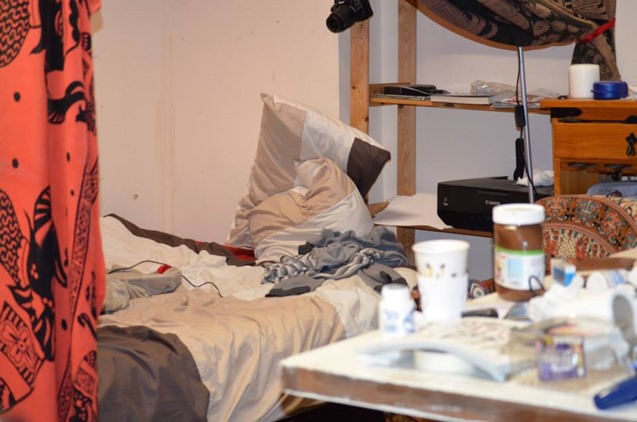Looking upon London’s skyline, the view is arguably better than from the Shard. The roof terrace is an architectural dream, let alone the house it sits upon. Next door is a house almost identical, where a room alone costs £1,000 a month, which could be considered a good deal considering it’s a mansion in Central London. But Vangelis and 15 others live in this house and they pay peanuts, writes Laura Buckley.
Why? Because of former squatter Vangelis Vourazeris; with nothing but €200 in his back pocket and a loose plan to sleep in Victoria station for his first days in London; it was a warm greeting when his first night was actually spent in a beautiful house, with great company and in his words, “a fucking good night.” This of course, was completely free.
Whilst 60 per cent of homeless people in London sleep on the streets, how is it that Greek-born Vangelis Vourazeris is welcomed by the warm bosom of the squatting community and manages to find somewhere on his first eve here? “Couchsurfing,” he beams.
Couchsurfing
Couchsurfing International Inc. is a hospitality exchange and social networking site with over one million users around the world. The site allows members to talk to one another and ultimately have one member host another and vice versa, all for free. This, of course, is not squatting, however, within the ‘London’ tab, there is a sub-category labelled ‘squatters’. “All of the people I’ve squatted with started out as Couchsurfers,” said Vangelis.
Squatting
Completely ignorant of the squatting culture prior to moving to London, Vangelis said it was “unheard of back in Athens” and he had to Google it to find out what it meant. “It came out with all these punk people with earrings and like crazy parties and stuff, I was intimidated and afraid.”
Unaware of what to expect, Vangelis arrived with his bags and guitar and rang the bell to his new found squat. “It looked like a normal house from the outside and they opened the door and there were three very good looking girls there to greet me, they were like ‘ah, hello! Welcome, would you like some tea?’ Okay, this is squatting? I like it I thought. This is cool.’” He laughs.
According to English Law, ‘squatting is when someone knowingly enters a building as a trespasser and lives there, or intends to live there. Squatting in a non-residential building or land in itself isn’t a crime.’ However, ‘squatting in residential buildings (like a house or flat) is illegal. It can lead to six months in prison, a £5,000 fine, or both.’
Vangelis has lived in a residential building illegally, “in the first squat in Camberwell, we didn’t pay anything, because it was a squat, a real squat.” The agency that owned it had many properties in London, so they didn’t notice the squatters living there for two months. “We didn’t have any annoyances; it was like a party everyday. No one was working, everyone was just fucking enjoying themselves; it was the best time ever.”
However, the fate of the squatter’s den took a turn for the worse, “they started going through the selling process of the house and sent a surveyor round to value it, so they found us. Shortly after, they sent us a paper saying we had to appear in court, so in August we were supposed to leave.”
Property Guardians – the ‘sophisticated squatter’
But they didn’t, the squatters decided to negotiate with the agency, as it came out, it was apparent it was more profitable for them to have people in their properties, than if they were empty. “If there is a leak, and we’re living here, we’re going to fix it because it is affecting us. So we made clear these points, so that’s how we got to sign the contract,” Vangelis explains. After you have signed a contract like this, you become a ‘Property Guardian’.
The contract allows the squatters to stay within the residential building in question for an allocated amount of time, their current contract is six months, it will then either be renewed to that property or they will be re-allocated a new house.
“They give us one month to leave, if buyers are found,” says Vangelis positively, “this doesn’t happen in a squat, you have to go in one week, it’s much better living like this, squatting is fun, but it’s not stable, you cannot build anything on it, it’s not permanent.
These kind of negotiated contracts are widespread, but discreet, and have gone back as far as the 70’s. Banji Adu, 58, squatted during this period, right through to the mid eighties when “squatting was huge” he said.
“You could go to the Advisory Service for Squatters and find out exactly where the nearest free squat was, and the legal implications. It was socially acceptable then,” said Banji. The Advisory Service for Squatters [ASS] is a collective of workers who have been running a daily advice service for squatters and homeless people since 1975.
But similarly to Vangelis, Banji found himself striking up a deal, with the same conditions as Vangelis. “We all did it because it was cheap,” said Banji, “of course we used to do it for free, but this way you have security.” Lots of squatters stayed in abandoned council houses because they “wouldn’t bother to evict you.” But then the “council got wise” and formed housing co-ops, they made it more official for you to stay in empty housing, it was at this point everyone starting negotiating, like Banji did.
Skipping
Alongside – basically –free housing, it seems most squatters have a generally cost-effective lifestyle as a whole. “I’ve never paid to eat,” says Vangelis. “Everyone here ‘skips’’. By this he doesn’t mean they skip meals or have a passion for skipping ropes.
Skipping (or Freeganism) consists of going to a business after hours and taking the food they have thrown away in their skips.
Vangelis insists it’s legal, which is true to an extent; taking food from bins isn’t illegal.However, trespassing is. “So perhaps you just have to jump a fence or whatever, but sometimes you can just talk with the people inside and you get them to agree to give you some stuff.” Vangelis explains.
Waitrose worker Ben Fallows brings light on the other side of the fence “If we are found not to be throwing out expired food and either giving it to people or keeping it to ourselves we can be fined £100,000 per item. We are supposed to ensure we are disposing of food properly, people skipping could land us in big trouble.”
“It’s very common in London” says Vangelis, “Sushi places, supermarkets and bakeries are the best and it’s packaged, so it’s alright. I’ve never been sick from eating this food, even if it’s expired. It’s still okay.”
The free life
For those entering adulthood into an economic recession, especially in London, are finding alternative ways to live, and can you really blame them? Where older generations had the freedom of more liberal squatting laws, we have the world of the digital age, where it takes less than ten seconds to apply on Couchsurfing. In this time of financial insecurity, there’s a wanting to help each other out, this is something that has been thrust upon this generation.
Vangelis barely pays for accommodation; he doesn’t pay council tax, bills, or food. He also uses the internet from the pub next door for free and walks everywhere. “Each month I save over £1,000 a month; I work in a bar. I won’t have to work when I go to university and I can travel whenever I want.” It’s clear that Vangelis doesn’t just live for free, but he has the freedom to do whatever he wants.
by Laura Jean Buckley







